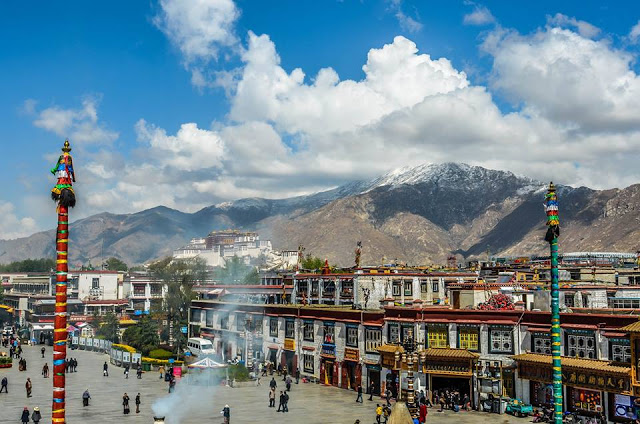
(TibetanReview.net, Oct20, 2015) – In a further effort to win over the Tibetan monastic community so that it will support the Chinese government and oppose their exiled spiritual leader, the Dalai Lama, in exchange for their socio-economic needs being taken care of, senior Tibet Autonomous Region officials had invited eminent monks of the major Buddhist monasteries to their homes over Oct 14-15 to have tea and engage in small talks, reported China’s online Tibet news service eng.tibet.cn Oct 19. They talked openly about a number of topics, including protection of temples, Buddhist activities, monk school life, strengthening national unity, opposing separatist behaviour and others, the report said.
Che Zala, the Lhasa Party Secretary, welcomed five monks from the Yangpachen Monastery to his home. They drank butter tea and engaged in small talk, the report said. He has described Yangpachen as a traditional, patriotic and religious monastery and the government will do it’s best to solve its problems. He has alleged that although Tibetan religion was enjoying a good period of development, the Dalai Clique still remained the biggest factor hindering this development.
Dorje Tsedrup, a vice-chairman of Tibet Autonomous Region (TAR) government, and two vice-chairmen of TAR Chinese People’s Political Consultative Conference (CPPCC), Losang Jigme and Ngawang, were reported to have invited monks of Jieji Monastery, Ganden Monastery and Nalianzha (or Nalanda) Monastery to their homes.
Ngawang was reported to have complimented the Nalianzha Monastery for having upheld its fine tradition of loving their country and religion, especially during the ‘Lhasa Riot’ on 14th Mar 2008, where the monastery played no part. “Everybody must resolutely safeguard and strengthen national unity, oppose separatists and make due contributions towards making Tibet a model of national unity.”
Deputy director of the TAR People’s Congress, Wu Jinhui, and vice-chairman of the TAR government, Gesang Ciren, were reported to have invited monks from the Drepung and Sera monasteries, respectively, to their homes.


